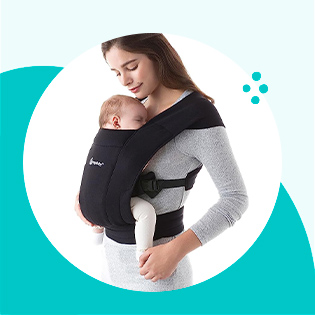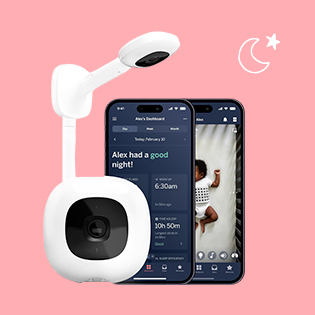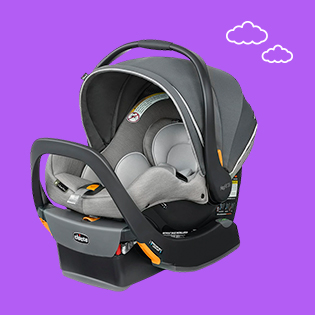Every toddler is gifted in some way — though sometimes parents have to look beyond the obvious to see where their tot’s talents lie. Some kids have a way with words, others with crayon and paper. Still others are stars on the playground, able to scamper up the slide when their peers are still perfecting their walking skills.
That said, however, there are some actual signs that you might have a gifted child. And if you suspect that your toddler is developing at an accelerated pace, you may be curious what (if anything) you should do about it.
"My son sings so many songs [and] remembers things from months ago, I’ve been wondering how to help him advance further and if this is considered gifted," says What to Expect Community user CatTeddyChunk.
Here’s what parents should know about giftedness in young children, including how to encourage your toddler’s development in a healthy way.
What does it mean for a toddler to be gifted?
The American Psychological Association (APA) defines giftedness as “possessing a great amount of natural ability, talent or intelligence.”[1]
It can take different forms, ranging from academic achievement to athletic prowess to creativity, the APA says. But children who are gifted usually perform at a very high level compared to their peers, according to the National Association for Gifted Children (NAGC). Kids displaying these kinds of talents might be considered for extra learning opportunities to help develop them further.[2]
In toddlers, "giftedness is often identified through milestones that exceed expectations for their age," says Florencia Segura, M.D., a pediatrician at Einstein Pediatrics in Vienna, Virginia, a spokeswoman for the American Academy of Pediatrics, and a member of the What to Expect Medical Review Board.
Read This Next
Assessing these skills can be tricky at any age, but that's especially true for tots who are not yet school-aged. This is partly because measures for giftedness vary a lot, the NAGC says.
To further complicate things, there's no clear-cut template for giftedness — it can look extremely different from person to person.
Signs your toddler may be gifted
Again, experts don’t have one agreed-upon measure for giftedness. But it’s possible that your curious cutie might be gifted if she is:
- Hitting speech milestones early
- Has a large vocabulary for her age
- Is a quick learner who remembers most of what she sees and hears
Early language development, in particular, can be a sign, Dr. Segura says.
"Toddlers who speak in complete sentences with proper verb-noun agreement before age 2 may demonstrate advanced cognitive abilities," she says. "This skill often reflects heightened observation, memory, and communication capacity."
As your little one gets older and starts school, you may notice (or be told by her teachers) that your child excels academically, is exceptionally creative, has strong leadership skills, or is particularly good at certain sports, to name just a few examples.
Children with exceptional talents may also gain new skills easily and be very curious about and interested in learning.[3]
What to know about testing for giftedness in children
Don’t run out to have your tot tested just yet. For one thing, tests for young children aren’t always accurate. Plus, they can assess only a limited number of skills (like how good your munchkin’s memory is, or how well she’s able to focus).
What’s more, determining giftedness should ideally be done over time rather than with a single assessment or test, the NAGC says.[4]
And ask yourself what you’d do with the results. While there are some preschools that are geared toward gifted toddlers, are there any real benefits to labeling a little one this early?
Pushing her to learn all her letters or to read before she’s 3 won’t guarantee a diploma from Harvard, and it may just turn her off to learning before she’s ready for kindergarten.
All children have unique gifts worth celebrating. But some kids might be considered gifted if they display exceptional talents, intelligence, or abilities.
There's no one measure or test for giftedness. Still, there are some signs experts look for. In toddlers, this might look like meeting speech milestones early, having a large vocabulary for their age, or being an incredibly quick learner.
As your child starts school, you may notice other signs, such as excelling academically, being exceptionally creative, having strong leadership skills, or being particularly good at certain sports. But giftedness can look very different from person to person.
So-called intelligence or giftedness tests in children aren't always accurate. Tests like these can be problematic, too. For young kids, a better strategy is to encourage reading, exploring, and playing, all of which will help nurture a lifelong curiosity and love of learning.
Finally, while IQ tests are still used to evaluate giftedness in some educational settings, these can also be problematic. Throughout history, eugenicists used intelligence tests to justify racist and discriminatory policies.[5] Bias in these kinds of tests has also contributed to vast education disparities.
So while school-aged kids displaying exceptional talents may be given an IQ test, know that this is far from the only way to determine giftedness or intelligence in general.[6]
How to encourage your toddler’s development in a healthy way
All this doesn’t mean you should ignore your gifted toddler’s talents. The trick is to find the right kind of intellectual stimulation without going overboard. Here’s how:
- Encourage her… If your tot’s good with words and numbers, build on her interests. Read books to your toddler — at naptime, bedtime, bathtime, or whenever you need to dial down the action or want to snuggle. "An excellent body of research emphasizes how reading builds foundational language and cognitive skills," says Dr. Segura. Point out words and letters while you’re out and about (“Look — the sign says S-T-O-P, STOP. Now the cars have to stop so we can cross”) and play counting games (“There are one, two, three flowers on your shirt!”). Your tot will love the attention and the support you show her.
- …but keep it fun. Yes, your cutie already knows her colors, but the good times lie in finger-painting, drawing with crayons, and wielding a brush. Playing simple matching games can help her recognize patterns and boost her memory skills. Singing and playing toddler-friendly instruments can help her learn new words and reinforce concepts like cause and effect. Focus on fun and minimize the formal lessons. After all, all toddlers (and other children) learn best through play.
- Facilite her social-emotional learning. Equally as important as reading, Dr. Segura says, is nurturing your child's social-emotional learning through play. This can look like teaching turn taking, demonstrating how she can manage her emotions, and guiding her on navigating setbacks. "These interactions lay the groundwork for resilience, empathy, and cooperation, [which are] crucial for lifelong success," Dr. Segura says.
- Help her explore different interests. Your child may excel at dance, for example, but encouraging her to try other activities can help build resilience. "For instance, encourage her to try a new activity like soccer or an art class, even if it’s outside her comfort zone," says Dr. Segura. "These experiences teach the value of hard work, practice, and bouncing back from setbacks."
- Nurture other skills. Raising a bookworm is great, but raising a bookworm who loves to run around and is kind to other kids is even better. Whenever she shows empathy or shares a toy with a playmate, cheer her on. Give her lots of chances to get outside and move, and applaud her when she’s game enough to try something new — especially if it’s different from what she normally likes to do.
- Avoid perfectionism. Even gifted kids make mistakes, and absolutely no one is perfect. You can help model balance by teaching your child to take pride in trying her best, regardless of what that performance looks like, and celebrating her process. "My girl amazes me every day!" says What to Expect Community user mrclarke. "You can almost see the little gears turning in her head with every interaction and experience at this age."
Remember: There will be time for formal learning — and maybe even testing — when she’s older. Once your child starts school, you can talk to her teachers if you think she’d benefit from any educational changes to support certain talents. But for now, enjoy the incredible little person she’s becoming.


















































